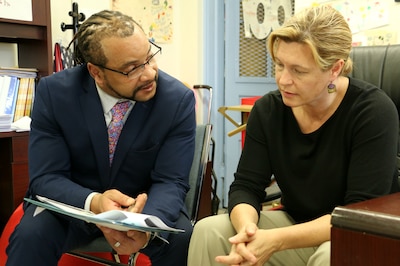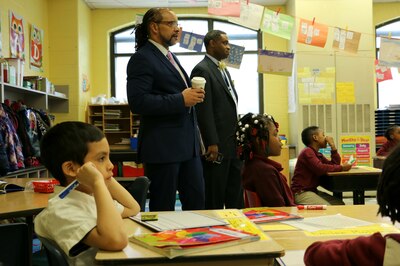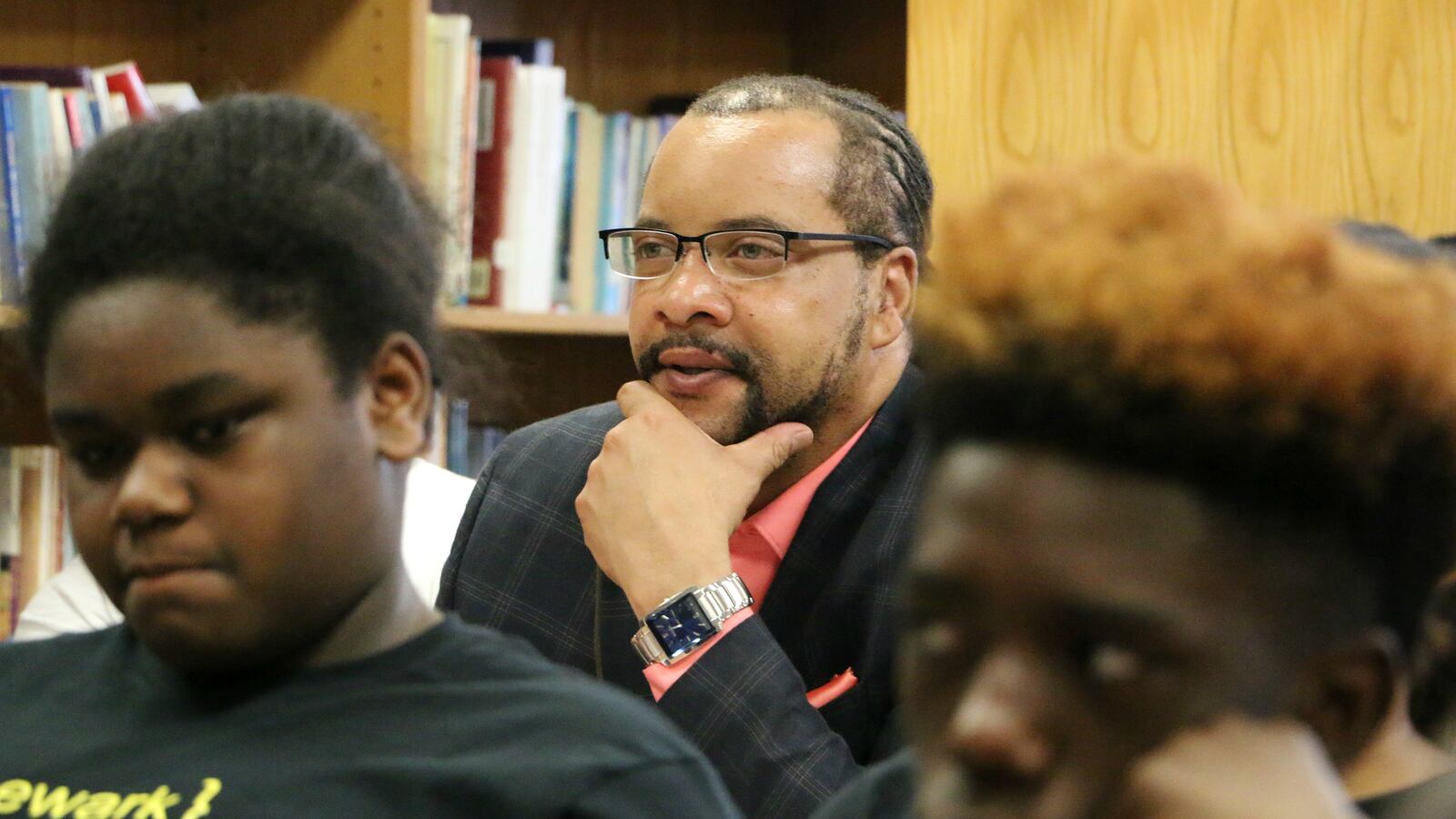A. Robert Gregory, who became interim superintendent of the Newark school system in February, did not wait to shed the interim status before settling into the corner office reserved for superintendents.
He has adorned the walls with graduation pictures of him and his parents, awards he won during his nearly 20 years as a Newark teacher and principal, and a black-and-white photo of Muhammed Ali knocking out an opponent. On his desk he placed a well-worn copy of “Savage Inequalities,” whose inside cover contains an inscription his late father — himself a well-known Newark principal — had written when Gregory considered quitting during his second year of teaching: “Never give up on our people!”
“I’m very proud to be in this seat right now,” Gregory said during an interview last month in his office on the third floor of Newark Public Schools’ new downtown headquarters. “And I’m not trying to give it up.”
Newark regained authority over its schools this year after more than two decades of state control — making the next superintendent the first to be chosen locally in a generation. Whoever is selected will face the enormous task of forging a new path forward for New Jersey’s largest district, after wealthy outside donors and state-appointed leaders spent years reshaping its schools.
The city’s elected school board has until May 31 to hire a new superintendent. It has not yet announced the finalists of its national search, but Gregory is expected to be one of them. A Newark native with deep knowledge of its schools, he is considered a frontrunner — but one with some liabilities, who may be up against stiff competition.
Gregory is the handpicked successor of Christopher Cerf, the state-appointed superintendent who stepped down in February. Cerf and his predecessor, Cami Anderson, are associated with a series of controversial policies — closing low-performing schools, expanding the charter-school sector, trying to remove ineffective teachers — that were championed by so-called “education reformers” but fiercely opposed by the city teachers union and many Newark residents.
Besides his endorsement by Cerf, Gregory was also chosen as a “Future Chief” by the group Chiefs for Change, which has ties to the education-reform movement. Yet because of his local roots and relatively brief overlap with Cerf in the district office, he has retained the trust of many who might otherwise be wary of such associations — including the teachers union.
He is also revered by many of the students, parents, and educators he’s worked with over the years and has used his time as interim chief to raise his public profile. On Saturday alone, he made appearances at a school-board retreat, a robotics competition, a teacher hiring fair, a South Ward schools event, an LGBTQ student celebration, and a high-school jazz concert.
Still, he has relatively little experience as a top district official. By contrast, one of the other candidates the board is said to be considering, Andres Alonso, previously ran the Baltimore school system.
And Gregory may not be the only local candidate in the running. Another rumored contender is Roger Leon, a former Newark principal and current assistant superintendent who was recommended by the board to become superintendent in 2015 but was turned down by the state.
Now, as the superintendent search enters its final stage, any jockeying among candidates and lobbying of board members is happening out of public view. But whoever is hired will instantly become the public face of the district and the person whom board members, interest groups, and politicians turn to as they try to influence the district’s direction.
“Whoever becomes superintendent of Newark Public Schools is going to have to navigate through this maze of nonsense,” said Loucious Jones, a longtime parent-activist who said the challenge will be to put students ahead of politics. “Can you be true to the children of Newark? Can you be their advocate?”
From teacher to leader
One bright morning last month at the Sussex Avenue Renew School, Gregory was seated inside Principal Darleen Gearhart’s office, talking about roller skates.
He has visited about two dozen elementary and middle schools since February. For Gregory, who is most familiar with high schools, the 90-minute tours have allowed him to meet new principals and start forming what he calls a “heat map” — a rough grouping of schools according to how much support and supervision they need. For principals, the visits have provided a preview of the man who could become their next boss.

At Sussex Avenue, a once-troubled school that has steadily improved under Gearhart, Gregory sat next to the principal and reviewed the school’s rising test scores. “Phenomenal,” he said, before giving Gearhart a fist bump. But Gregory was equally impressed when she explained how she had taken her teachers’ suggestion and bought roller skates for students to use during phys-ed class.
“Roller skating, I love it!” Gregory said. “But the better thing is, your teachers thought about it. So you’re tapping into what motivates them. Smart — Ed Leadership 101.”
Gregory has honed his own leadership style in the two decades that he’s worked in Newark schools.
As an English and social-studies teacher at Camden Middle School in the early 2000s, he led his students to victory in a statewide civics competition. One year, as part of that contest, they lobbied the city to install a traffic light at an intersection where a student had been killed.
He motivated students by being forthright with them, said Khadijat Yekeen, Gregory’s former student at Camden.
“He’d tell us the reality is we’re already at a disadvantage because the color of our skin and the city we come from — but we can push past that,” recalled Yekeen, who credits Gregory with inspiring her to become an English teacher.
In 2006, he became the founding principal of a new magnet school, American History High School. Like other magnet schools, it has competitive admissions, though Gregory said it “wasn’t a real magnet school” because many admitted students entered far behind academically. Still, any future superintendent will likely have to address complaints by parents and some educators that magnet schools exclude too many Newark students.
At American History, Gregory went to great lengths to support and encourage the faculty, said Hassanah Blake, a former teacher there.
Gregory would email teachers articles about their craft or bring in books from home and occasionally took over a class himself so he could model certain techniques. During Teacher Appreciation Week, he planned a different treat each day — Dunkin’ Donuts gift cards, pep rallies, free professional massages.
He also allowed teachers to design their own curriculums as long as they ignited students’ interest, said Blake, who is now a vice principal at University High School.
“The autonomy he gave us is what allowed the magic to happen,” she said. “That was a powerful experience.”
Still, if teachers failed to meet his expectations and did not show a willingness to improve, he would encourage them to leave — or force them to. Gregory said he was one of the few principals to successfully bring a charge against a tenured teacher before the state’s tenure law was changed in 2012.
“I will never back down from that fight,” he said last month. “We can build skill; we can’t build will.”
As with other tactics he used as a principal, they could encounter new complications and resistance if enacted across the district.
Politics 101
In 2015, Gregory made the leap from principal to district leader — a role, he’s finding, that is infinitely more political than running a single school or classroom.
After Gregory served as assistant superintendent of high schools for less than two years, Cerf promoted him to deputy superintendent last June. In effect, Cerf had chosen his replacement if he stepped down early — which he did in February, in an effort to jump-start the district’s transition back to local control. (Technically, the school board could have chosen someone else to serve as interim superintendent, but its members voted for Gregory.)
Still, Gregory does not see his role as simply extending Cerf’s legacy. Gregory said his predecessors had achieved some positive results, but he plans to chart a different course.
“I would definitely not characterize myself as a ‘reformer,’” he said, “because I don’t believe in a playbook. I believe in differentiated leadership and instruction based on the situation.”

Unlike self-described reformers, Gregory said he’s not interested in overhauling the district or wading into pitched policy battles. For instance, he called arguments over the merits of traditional versus charter schools “a stupid fight to have.” Instead, his focus is on applying his approach as principal to the entire district — recruiting and supporting strong teachers and allowing high-performing schools to earn autonomy.
“The next wave of this work is developing people,” he said. “How do we make our teachers better? How do we make our principals better so we can get better outcomes for kids?”
But the flipside of developing talent — how to determine who is a good teacher (or not) and what to do with those who receive low ratings — remains hotly contested. The next superintendent will undoubtedly be dragged into the political fray over that and other issues.
The Newark Teachers Union, for example, opposed Anderson and Cerf at every turn. Although Cerf promoted Gregory, NTU President John Abeigon said he does not associate the protégé with his predecessors. Of Gregory, Abeigon said, “He’s professional, he’s affable, he gets it.” But the union leader said he would push hard on Gregory or whoever becomes superintendent to undo any remnants of the previous era.
“Eliminate anything and everything associated with the last eight years of corporate reform,” Abeigon said, “and terminate anyone who was hired by them.”
For his part, Mayor Ras Baraka has promised “to have as heavy a hand as possible” in the district, even though he has no direct authority over it. He joined a North Ward councilman and charter-school supporters in backing the three winning candidates in last month’s school board election. And he helped choose a controlling four of the seven members of the committee that selected the superintendent finalists, whom the full board will vote on in the coming weeks.
Meanwhile, the board is eager to reassert itself after offering only suggestions during the 22 years of state dominance. Board member Tave Padilla said the board will not interfere with the day-to-day operation of the district, but board members do expect to have a say in district policy and finances.
“The superintendent’s office has to come to the understanding that we’re not advisory anymore,” Padilla said. “We’re not going to advise you that this is what we want to do — we’re going to tell you.”
Local support
As Gregory tries to hang onto his perch in the superintendent’s office, he may end up competing with colleagues in the district.
Several board members and community leaders have made clear that even though the state required a national superintendent search, they would prefer a homegrown leader. Any local candidates will come with their own bases of support.
Joanne Gobin, a former parent at American History High, said the possibility that Gregory will become the next superintendent is one reason she keeps her children in Newark schools. Cheryl Whitley Crawford, who taught alongside Gregory at Harold Wilson Middle School in the 1990s, said he’s the only colleague she remembers from that time.
“I swear by him,” she said. “He can turn this district around.”
During his visit to Sussex Avenue Renew School in April, Gregory stopped in a hallway to hug a kindergarten teacher who said, “I know this guy!” On a stairwell, he embraced a school safety agent whose nieces and nephews he once taught, and whose mother was an usher in his childhood church.
But for all his local credentials, Gregory’s fate is ultimately up to the school board — a fact that Sussex Avenue’s chief innovation officer, Christopher Constantino, alluded to at the end of Gregory’s visit.
“I wish you good luck, man,” Constantino told him. “I hope you get it.”
Clarification: This story was updated to note that the Newark school board voted for Gregory to fill the role of interim superintendent.

